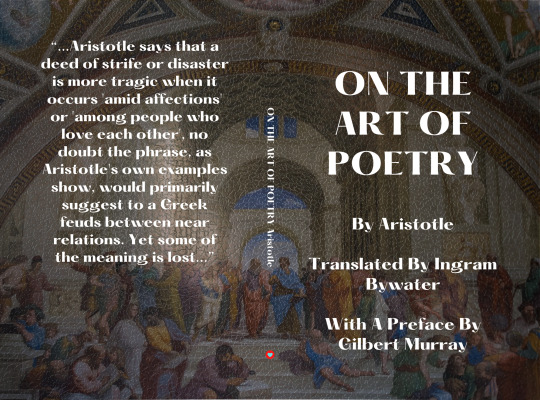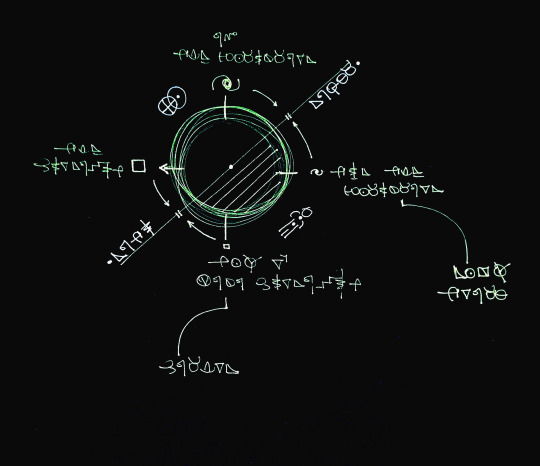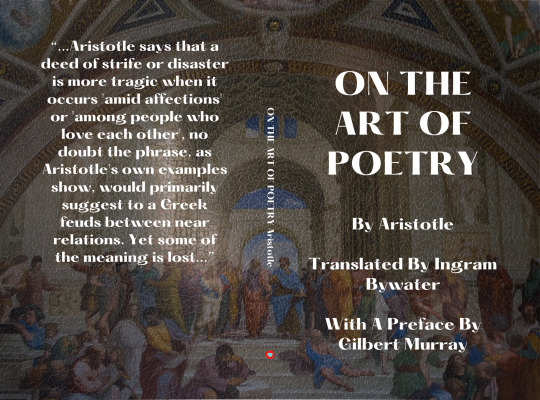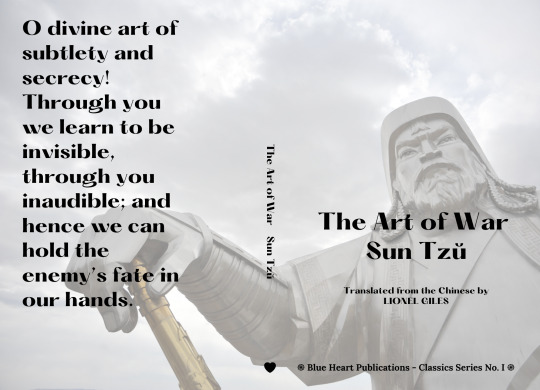#Universal principles
Explore tagged Tumblr posts
Text

When trying to understand Divine Timing think of the unfolding of the seasons, we can give it a date but they unfold in their own time.
#universal principles#divinetiming#divineorder#divine timing#alignment#witchy studies#modernwitchcraft#modernwitches#modernwitchsguidetolife#witch#witchy#witches#witchcraft#nondenominationalwitchcraft#bookofshadows#grimoire#witchblr#Spotify
4 notes
·
View notes
Text
Delving into Poetic Wisdom: A Review of "On the Art of Poetry" by Aristotle

Aristotle's "On the Art of Poetry," translated by Ingram Bywater, stands as a seminal work in literary criticism, offering profound insights into the nature and function of poetry that continue to resonate with readers and scholars alike. Written in the 4th century BCE, this treatise serves as a comprehensive examination of the principles and techniques that underlie the creation of poetry, providing valuable guidance for poets and readers alike.
At its core, "On the Art of Poetry" is a testament to Aristotle's keen intellect and analytical prowess. In this work, Aristotle explores the various elements that contribute to the effectiveness of poetry, including plot, character, diction, and spectacle. Through his systematic analysis, Aristotle seeks to uncover the universal principles that govern the art of poetry, shedding light on its essential nature and its role in human society.
One of the most compelling aspects of "On the Art of Poetry" is Aristotle's emphasis on the importance of mimesis, or imitation, in poetry. According to Aristotle, poetry is a form of imitation that seeks to represent the actions, emotions, and experiences of human life. Through the skillful use of language and imagery, poets are able to create a vivid and lifelike portrayal of the world, inviting readers to engage with their work on a profound emotional and intellectual level.
Moreover, "On the Art of Poetry" offers valuable insights into the principles of dramatic structure and the role of catharsis in tragedy. Aristotle argues that tragedy is a form of poetry that evokes feelings of pity and fear in the audience, leading to a purgation or cleansing of these emotions. Through the depiction of the fall of a tragic hero, tragedy allows audiences to confront their own mortality and the fragility of human existence, ultimately leading to a deeper understanding of the human condition.
In addition to its exploration of tragedy, "On the Art of Poetry" also examines the principles of comedy and epic poetry, providing valuable guidance for poets working in these genres. Aristotle discusses the importance of unity of plot, character, and theme in epic poetry, as well as the role of humor and satire in comedy. Through his analysis, Aristotle highlights the diversity of poetic forms and the unique challenges and opportunities that each genre presents to the poet.
In conclusion, "On the Art of Poetry" by Aristotle is a timeless classic that continues to inspire and enlighten readers with its profound insights into the nature of poetry. Aristotle's systematic approach to literary criticism, coupled with his keen observations and analytical rigor, make this work an indispensable resource for anyone interested in the art of poetry. With its timeless wisdom and enduring relevance, "On the Art of Poetry" remains a cornerstone of literary theory and a testament to the enduring power of poetic expression.
Aristotle's "On the Art of Poetry," is available in Amazon in paperback 12.99$ and hardcover 18.99$ editions.
Number of pages: 116
Language: English
Rating: 10/10
Link of the book!
Review By: King's Cat
#Aristotle#Poetry#Literary criticism#Mimesis#Imitation#Dramatic structure#Tragedy#Catharsis#Comedy#Epic poetry#Unity of plot#Characterization#Diction#Spectacle#Poetics#Aesthetic principles#Greek literature#Philosophical discourse#Aristotle's theory#Literary analysis#Poetic form#Emotion#Human experience#Morality#Ethics#Aesthetics#Universal principles#Literary genres#Rhetoric#Imagination
3 notes
·
View notes
Text
This metaphor works for every aspect of politics, from office politics to nations losing their ability to hold elections to how to get something done about climate change before we destroy ourselves.
Always bug your politicians to be proactive about preventing problems, not just kicking the can down the road eternally. Emails, texts, phone calls, hand-written letters... whatever it takes, constantly remind them what needs attention.

#us politics#politics#uspol#american politics#2024 election#trump#harris#kamala harris#vote harris#principles#universal principles#political principles
4K notes
·
View notes
Text
Exploring the Deeper Meanings of Jesus’ Teachings: A Mystical Perspective
In today’s world, spiritual teachings often face the challenge of being understood in their deeper, more mystical sense rather than just their literal interpretation. This post seeks to explore the profound insights embedded in Jesus’ teachings, especially His statements about being the gate, the light, the truth, and the way, and to compare these with the principles of Advaita Vedanta, which…
#Advaita Vedanta#Christian spirituality#deeper understanding#divine reality#embodying teachings#Gospel of John#Jesus teachings#Love and compassion#modern Christianity#mystical perspective#mystical spirituality#personal transformation#profound insights#spiritual enlightenment#spiritual growth#spiritual journey#Spiritual Practice#universal principles#universal truths#Zen teachings
0 notes
Text
youtube
Summary: Left wing dingbat tries to make the case about why the United States was never a Christian country. This stood out to me because of what Michael Knowles had to say about reason and universal principles.
From the transcript:
The first thing that strikes me about this New York Times piece is the ignorance. This woman just has no idea what she's talking about. The second thing that strikes me is the obliviousness when she says they (Christians) want to make you submit to their beliefs.
Yeah lady you just finished pride month. You demand that we submit to your beliefs not just on Pride but on all of liberalism even on the rejection of Christianity in American public life. That is a liberal demand and it's a totalitarian demand. You're demanding that we Christians give up our beliefs to buy into your nonsense ideology and you are far more authoritarian in your insistance upon that than any Christians are in America.
Here's the kicker. While most of the Ten Commandments involve Universal Principles and moral precepts that can be found in the Bible, not everyone draws ethical guidelines from religion. When the 10 Commandments say thou shalt have no other gods before me the implication is there is one true God. That is decidedly not true for all Americans line by line. Most of the Ten Commandments involve Universal Principles.
What makes a Universal Principle? Notice she gets it backwards. I think good evidence that a principle is universal is that it's in the Ten Commandments because those come from God Himself. She thinks it goes other way around. Well no, it's just that we know the universal principles and maybe some of Christianity fits into that. Well okay, where do you get your Universal Principles from? She's maybe deduced those principles from reason. Okay I believe in that. I'm a natural law guy. I believe that the natural law is inscribed on every human heart, and that we can know universal moral truths through reason.
We can know the existence of God with certainty from human reason. How do you know your reason is reliable? How do you know that? Why can you trust what your reason says in as much as you trust it? The only way that it's possible is if the universe is intelligible, and if there is an intelligence which created the universe, and if you have some of that intelligence. If, in other words, you are made in the image and likeness of God.
To trust your own reason, to come to certain conclusions about universal moral principles or whatever implies, -whether you want to admit it or not- that you believe in God. To attack Christianity for saying -and Judaism for saying- Thou Shalt Have No Other Gods Before Me, the implication is that there's one true God.
Well yeah, I mean if there's such a thing as God at all, which they're necessarily must be, then there will be a true God. There will be lots of false gods, and because of that, we can distinguish between truth and falsehood using our reason.
That's how you supposedly came to your Universal Principles lady, and she obviously believes that there is one true God. For her it's the one true God of liberalism which is really just the worship of the self. She's saying that Christians your God is false. My liberal God is true, and you will bow down before my liberal God, and you will shut up and get out of public life. That's what she's saying that there's one true God (and she and her cronies decide what it is)..
That is decidedly not true for all Americans. No you're saying that all Americans should worship only the self. The problem with that is then you have a lot of different little gods. You're all very jealous Gods, -all of you individuals- and so you're going to impose your irrational will on everybody by telling Christians to shut up in public life. Your religious values are not American values. Forgive them Father they know not what they do.
The ignorance is striking because you know 50 or 60 or 70 years ago a grade school child would understand the basic aspects of American history that this New York Times journalist denies. It's the obliviousness what she speaks out against as being authoritarian and infringing on the religious rights of others in Christianity. She herself is imposing in a far more authoritarian and irrational way. They don't even know. Yes, the journalists lie. Yes, the journalists are corrupt and deceptive, but they're also just so ignorant and oblivious. You don't know. If you ever attempted to give them credit, you do not have to do it.
(This reinforces my opinion that people who consider themselves 'academics' in the media -so called intellectuals- can actually be the dumbest mf-ers on the planet. High IQ has little to do with spiritual intelligence or how susceptible one is to group think, being influenced by bad ideas, or caring too much about what other people think.)
#Youtube#michael knowles#leftist culture#universal principles#christianity#history lesson#self worship#judaism#us history#american history#paid shills
1 note
·
View note
Text
Another way to Create Your Reality
One of the definitions for the word: “Realization” is, “the fulfillment or achievement of something desired or anticipated”. This was a word that took a little time for me to reclassify within my vocabulary while I was pursuing my degree in mysticism. It makes so much sense though, to realize is to literally make something “real”, at least in the sense of the word as we understand it. It’s to…

View On WordPress
#Ancient Practices#Antisuyu Revelation#Cardinal Directions#Chinchisuyu Creation#Cultural Variations#Emotional Blockages#Emotional States#Energy Dynamics#Goal Setting#Inka Empire#Kollasuyu Awakening#Kontisuyu Resetting#Lifestyle Impact#Medicine Wheel#Mental Traps#Mystical Characteristics#Mysticism#Number Four Symbolism#Personal Growth#Physical Reality#Realization#Self-evolution#Shamanic Initiation#shamanic practices#Spiritual Awakening#Spiritual Tools#Tawantinsuyu#Transpersonal Integration#Universal Principles
1 note
·
View note
Text
Delving into Poetic Wisdom: A Review of "On the Art of Poetry" by Aristotle

Aristotle's "On the Art of Poetry," translated by Ingram Bywater, stands as a seminal work in literary criticism, offering profound insights into the nature and function of poetry that continue to resonate with readers and scholars alike. Written in the 4th century BCE, this treatise serves as a comprehensive examination of the principles and techniques that underlie the creation of poetry, providing valuable guidance for poets and readers alike.
At its core, "On the Art of Poetry" is a testament to Aristotle's keen intellect and analytical prowess. In this work, Aristotle explores the various elements that contribute to the effectiveness of poetry, including plot, character, diction, and spectacle. Through his systematic analysis, Aristotle seeks to uncover the universal principles that govern the art of poetry, shedding light on its essential nature and its role in human society.
One of the most compelling aspects of "On the Art of Poetry" is Aristotle's emphasis on the importance of mimesis, or imitation, in poetry. According to Aristotle, poetry is a form of imitation that seeks to represent the actions, emotions, and experiences of human life. Through the skillful use of language and imagery, poets are able to create a vivid and lifelike portrayal of the world, inviting readers to engage with their work on a profound emotional and intellectual level.
Moreover, "On the Art of Poetry" offers valuable insights into the principles of dramatic structure and the role of catharsis in tragedy. Aristotle argues that tragedy is a form of poetry that evokes feelings of pity and fear in the audience, leading to a purgation or cleansing of these emotions. Through the depiction of the fall of a tragic hero, tragedy allows audiences to confront their own mortality and the fragility of human existence, ultimately leading to a deeper understanding of the human condition.
In addition to its exploration of tragedy, "On the Art of Poetry" also examines the principles of comedy and epic poetry, providing valuable guidance for poets working in these genres. Aristotle discusses the importance of unity of plot, character, and theme in epic poetry, as well as the role of humor and satire in comedy. Through his analysis, Aristotle highlights the diversity of poetic forms and the unique challenges and opportunities that each genre presents to the poet.
In conclusion, "On the Art of Poetry" by Aristotle is a timeless classic that continues to inspire and enlighten readers with its profound insights into the nature of poetry. Aristotle's systematic approach to literary criticism, coupled with his keen observations and analytical rigor, make this work an indispensable resource for anyone interested in the art of poetry. With its timeless wisdom and enduring relevance, "On the Art of Poetry" remains a cornerstone of literary theory and a testament to the enduring power of poetic expression.
Aristotle's "On the Art of Poetry," is available in Amazon in paperback 12.99$ and hardcover 18.99$ editions.
Number of pages: 116
Language: English
Rating: 10/10
Link of the book!
Review By: King's Cat
#Dramatic structure#Tragedy#Catharsis#Comedy#Epic poetry#Unity of plot#Characterization#Diction#Spectacle#Poetics#Aesthetic principles#Greek literature#Philosophical discourse#Aristotle's theory#Literary analysis#Poetic form#Emotion#Human experience#Morality#Ethics#Aesthetics#Universal principles#Literary genres#Rhetoric#Imagination
1 note
·
View note
Text

Athena InsideOut Education is a Human Innovation Institute.
Exponential technological innovations have changed the world in recent decades. In order to keep up in the world of 2050, every person will have to reinvent herself again and again. Human Innovation stands for the expansion of human capabilities. And the expansion of human capabilities is a must in order to
a) build an innovation-driven economy and
b) develop the ability to cope with change, to learn, unlearn and learn new skills as well as to maintain a mental balance in disruptive situations.
The expansion of human capabilities requires new forms of education. Forms of education that are no longer primarily focused on cognition, but on both cognition and intuition. And forms of education that implicitly incorporate the well-being of each, whereas Well-Being stands for mental, physical and emotional maintenance, growth and resilience.
This is why our Value Proposition also includes Well-Being.
Visit us here: www.athena-ioe.com
#education#awareness-based leadership#science-based education#universal principles#equality#inclusion#sdgs4#sdg5#sdg8#sdg3#epigenetics#neuroscience#quantum field theory#resilience#purpose#purpose-driven#empowerment#mindset#shamanism#spirituality
0 notes
Text


TTRPGs teach Moral Values.
If we look at Kohlberg's Stages of Moral Development, we find players practising and learning these behaviors, values and principles at each stage.
#Kohlberg's Stages of Moral Development#Moral Values#Universal Principles#Avoiding Punishment#Consequences#Learning#Behaviors#Behaviours#Principles#Values#TTRPG#Tabletop#RPGs#Roleplaying Games#Moral Dilemmas
0 notes
Text
Endlessly fascinating phenomenon of students waiting outside a lecture hall that's empty, so there's no class leaving as a cue to go in. Everyone wants to go in but nobody wants to do it first, even though they must know from experience if someone does go in the rest will follow. Today we were outside a lecture hall that was empty and unfamiliar because our lecture was moved, and I watched someone actually peek in and then come out again, causing a ripple effect of students moving to go in and then stopping when our self appointed leader became unsure of themselves.
270 notes
·
View notes
Text
Water is actually one of the strangest substances known to science. This may seem a rather odd thing to say about a substance as familiar but it is surely true. Its specific heat, its surface tension, and most of its other physical properties have values anomalously higher or lower than those of any other known material. The fact that its solid phase is less dense than its liquid phase (ice floats) is virtually a unique property.
John D. Barrow and Frank J. Tipler, The Anthropic Cosmological Principle
#quote#water#science#physics#cosmology#cosmos#universe#The Anthropic Cosmological Principle#John Barrow#math#mathematics#Frank Tipler#Frank J Tipler#John D Barrow#nature#materials science#anthropic principle
264 notes
·
View notes
Text
"Mastering Strategy: The Enduring Brilliance of Sun Tzu's 'The Art of War'"

"The Art of War" by Sun Tzu stands as a timeless masterpiece in the realm of military strategy and has transcended its origins in ancient China to become a revered guide for success in various domains. Dating back to the 5th century BCE, Sun Tzu's treatise has not only influenced military tactics but has also found applications in business, leadership, and diplomacy. The title, "The Art of War," serves as an alluring invitation into the world of strategic wisdom, where Sun Tzu imparts his profound insights on warfare and the strategic mindset.
Sun Tzu's treatise comprises thirteen chapters, each a strategic gem that encapsulates the essence of successful warfare. The title echoes the overarching theme—the approach to war as an art form, requiring not only brute force but also a nuanced understanding of the psychological, logistical, and strategic dimensions of conflict. Sun Tzu's teachings are framed within the context of deception, adaptability, and the ability to understand and exploit the vulnerabilities of both enemies and oneself.
The treatise begins with the famous assertion that "All warfare is based on deception." The title, "The Art of War," encapsulates this fundamental premise, emphasizing the nuanced, strategic thinking required to achieve victory. Sun Tzu's emphasis on intelligence, reconnaissance, and the understanding of the enemy's mindset forms the foundation of his strategic philosophy. The title becomes a gateway to a world where war is not just about battles but about outthinking and outmaneuvering the opponent.
One of the enduring qualities of "The Art of War" is its adaptability to different contexts. The title serves as a beacon for leaders and strategists across diverse fields who seek to navigate the complexities of competition and conflict. Sun Tzu's teachings on the importance of knowing oneself and knowing the enemy resonate as universal principles applicable to corporate boardrooms, political negotiations, and personal development. The title becomes a mantra for those who understand that strategic thinking is not confined to the battlefield but is a crucial aspect of success in any endeavor.
Sun Tzu's strategic brilliance is evident in his emphasis on winning without fighting. The title encapsulates this paradoxical approach to war, where the ultimate triumph lies not in the bloodshed of battle but in the ability to secure victory through strategic maneuvers and psychological advantage. The treatise becomes a guide for leaders seeking to minimize conflict and maximize success through shrewd decision-making and calculated actions.
"The Art of War" is not a glorification of war but a pragmatic guide to achieving objectives efficiently and effectively. The title encapsulates the dichotomy of war as both a destructive force and a disciplined art form. Sun Tzu's emphasis on planning, adaptability, and the exploitation of opportunities resonates through the pages, making the title a symbol of strategic acumen that transcends time and cultural boundaries.
In conclusion, "The Art of War" by Sun Tzu is a masterpiece that continues to shape the understanding of strategy and warfare. The title, with its enigmatic simplicity, beckons readers into a world of strategic wisdom, where the artistry of war lies in the meticulous planning, insightful adaptation, and the ability to achieve objectives without unnecessary conflict. Sun Tzu's treatise remains a testament to the enduring relevance of strategic thinking, making the title not just an invitation to study military tactics but an exploration of the timeless principles that govern success in the art of war and beyond.
"The Art of War" by Sun Tzu is available in Amazon in paperback 10.99$ and hardcover 19.00$ editions.
Number of pages: 218
Language: English
Rating: 9/10
Link of the book!
Review By: King's Cat
#Sun Tzu#The Art of War#Military strategy#Ancient China#Strategic wisdom#Deception#Adaptability#Psychological warfare#Logistics#Sun Tzu's teachings#Know thyself#know thy enemy#Intelligence#Tactical acumen#War as an art form#Winning without fighting#Universal principles#Corporate strategy#Political negotiation#Personal development#Strategic thinking#Maneuvering#Calculated actions#Paradoxical approach#Triumph through planning#Efficient objectives#Disciplined artistry#Minimizing conflict#Maximizing success#Pragmatic guide
4 notes
·
View notes
Text


this is so unbelievably funny to me, less than 0.01% of people are willing to besmirch alfred
#i fucked up the math the first time but the point still stands#never seen a more universally beloved character#alfred pennyworth#batman#sorta surprised that even warrants its own tag its so small#but i guess ao3 tag wranglers probably do that for any given character on principle huh
88 notes
·
View notes
Text
Dick: Hey Jay, since you died before you turned 16, you don't have any form of legal ID do you? How did you go about that after you came back to life?
Jason: Oh so I actually had a fake ID from before I died that I still use. Wanna see it?
Dick: Sure.
Jason: *hands Dick a Hawaiian driver's license*
Dick: ...seriously?
Jason: What! It's a pretty convincing fake!
Dick: Your name is McLovin?
Jason: Yeah I was between that or Mohammed.
Dick: You based your fake id off of a goddam movie?
Jason: I was 13 okay!
Dick: You look like you're 7 in this photo.
Jason: Hey. It worked. And it still does.
Dick: I can't believe this. You are a literal crime lord. You deal fake IDs! They are pretty convincing ones too, good enough to trick both the Gotham PD and Batcave systems.
Jason: It's the principle, okay.
Dick: What fucking principle!
#the principle to stay committed to meme culture#i did the math#if jason is 19-23#he would have been alive when the mclovin movie came out#the photo on the id is actually one of him#but it was taken when he was 13#batman#dc#dc comics#dcu#batfam#dc universe#batman wayne family adventures#jason todd#wayne family adventures#dick greyson#redhood#red hood#nightwing#i really like making jason and dick sibling headcanons#they are such an iconic sibiling duo
252 notes
·
View notes
Text
despite not feeling like illario should be a parent or mentor figure to absolutely anyone at all. and of course lots of media has done "unhappy mentor to a young child that ends up getting attached". but have we all considered the idea of illario finding a fledgling that's been tossed aside or had their house stripped from them, sees his failure reflected back at him . right . and before he knows what he's doing and against his better judgement and his arrogance and his pride, illario brings them into house dellamorte. to start it's just to piss off caterina. give it about a month and he'll start projecting his own desire to succeed and since he can't rise above his own humiliation then this fledgling HAS to. and then he gets attached. and then during particularly gruelling and horrible crow training, illario reminds himself of caterina. right then and there he would have to decide if he can stomach turning into her, or if he can finally begin to understand the unconditional love that lucanis has always felt towards him
#sorry that stupid mentor-to-a-kid thing is one of my favorite tropes of ALL TIME.#my main is named after treasure planet for a reason and also i shouldnt even be blamed for this#fie got me here. THIS IS NOT MY FAULT#illario dellamorte#veilguard spoilers#could pregnancy save him.#AND ALSO SOMETIMES THE MORE ILL EQUIPPED A CHARACTER IS TO BE A PARENT OR MENTOR#THE CRAZIER THE DYNAMIC GOES. JUST SAYING.#edit: also thinking about this..#it would be fun if the fledgling is what prompts illario to leave because he realises he cannot protect them#while remaining with the crows. worse still he ‘abandons’ lucanis to fend for the house alone#because i still see that ruthlessness in learning to love but choosing his new kid over the brother that ruined him#and then ofc lucanis is left alone again by illario’s choices . lord.#this all of course takes place in some universe where i can see illario willingly give up power#which . its just . its odd. i dont even think he’s principled enough to do that rn#but i think that is what character development is for . i guess
76 notes
·
View notes